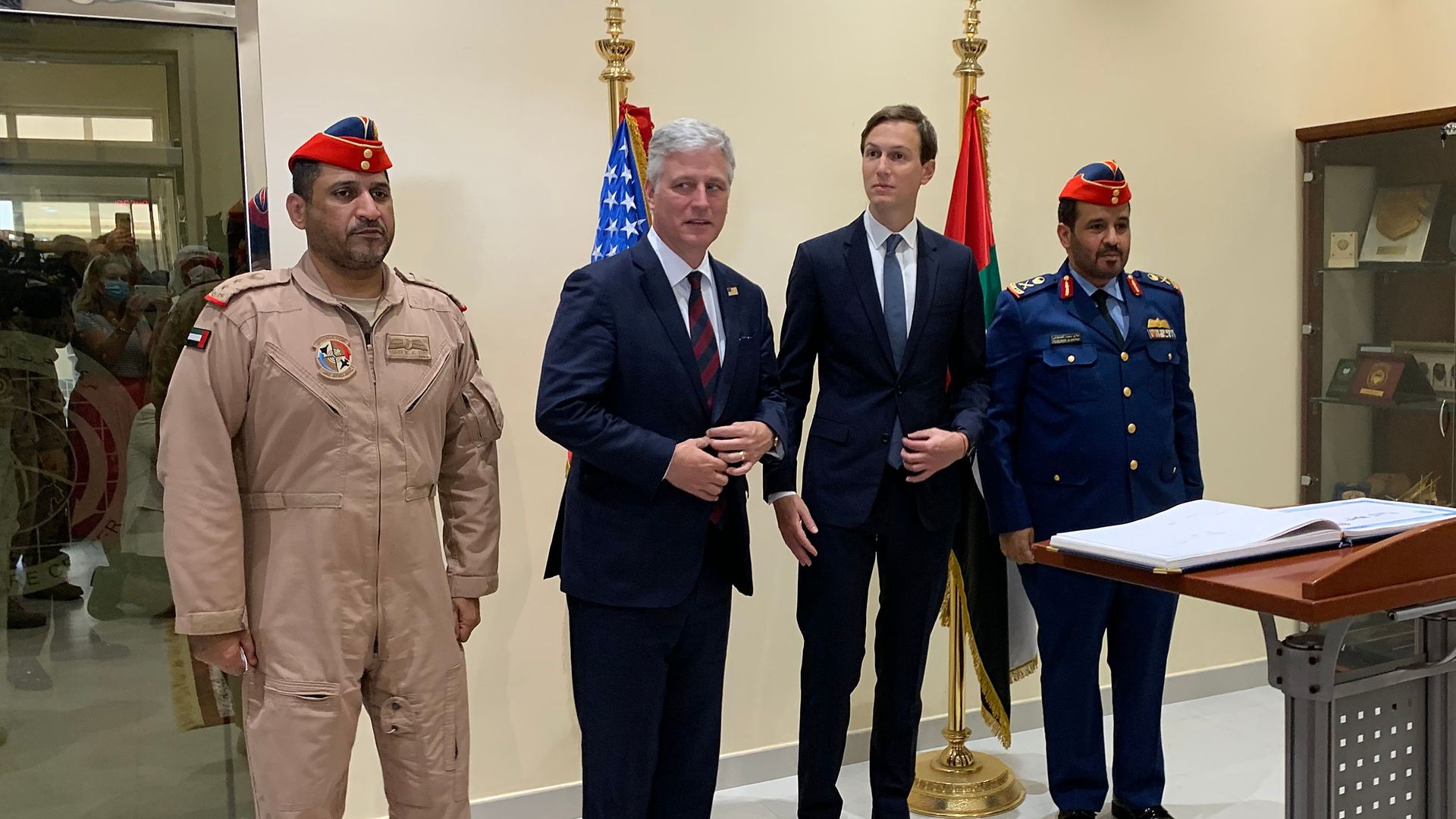Israel-UAE talks progress toward possible White House ceremony
Add Axios as your preferred source to
see more of our stories on Google.

Kushner and O'Brien at a military base near Abu Dhabi. Photo: Sarah Stewart/AFP via Getty
ABU DHABI, United Arab Emirates — Israel-UAE normalization talks are progressing faster than expected and could lead to an additional trilateral pact involving the U.S., officials from all three countries told me following talks in Abu Dhabi.
What's next: Israeli officials said a signing ceremony could take place at the White House before Sept. 18. For now, Israel's national security adviser has invited his Emirati counterpart to visit Israel to continue the talks.
Setting the scene: Officials from all three countries expressed enthusiasm about the pace, atmosphere and results of the talks, and optimism that the U.S.-brokered normalization deal would soon be implemented.
- One incentive for moving fast is to create momentum in the region, potentially leading additional Arab countries to recognize Israel (only Egypt and Jordan had previously done so).
- Officials from all three countries also said they hope to get a bonus out of the normalization agreement: a trilateral alliance between the U.S., Israel and UAE.
- That prospective alliance would focus initially on regional security, but could be broadened to other fields as well.
Behind the scenes: U.S. officials — including Jared Kushner and national security adviser Robert O'Brien — attended almost every breakout session in Abu Dhabi as Israeli and Emirati technical teams discussed investment, finance, health, space, civil aviation, foreign policy and tourism.
- The most interesting discussion came over dinner Monday night at the presidential palace, hosted by UAE national security adviser Tahnoon bin Zayed Al Nahyan, attendees told me.
- The talks underlined the central role of the U.S. in peace-making between Israel and its Arab neighbors, as the Carter and Clinton administrations previously proved with the Israel-Egypt and Israel-Jordan deals, respectively.
- But despite the warm feelings from the summit, Israeli and Emirati officials expressed caution about what future relations will look like.
Emirati officials said they hope for a relationship unlike Israel's "cold peace" with Jordan and Egypt.
- Given the UAE's wealth and development, they contend that a more balanced relationship is possible — but it must be based on respect.
- Several Emirati officials took umbrage at statements from Prime Minister Benjamin Netanyahu and other Israeli politicians about bringing together Israeli ingenuity and Emirati money.
- The Emiratis see themselves as the Arab startup nation — sending a probe to Mars, developing a coronavirus vaccine — and say they expect the Israelis to treat them as equal partners.
The other side: Israeli officials acknowledged it will be a challenge to build a deep bilateral relationship with the UAE that's based on trust and mutual interests — and not dependent on “having an American babysitter.”
- But they said they've been surprised by the Emirati charm offensive, which has involved heavily publicizing the new relationship in domestic media and through outreach to Israeli journalists, some of whom traveled to Abu Dhabi and were granted access to events and officials.
- Emirati officials say they hope their approach to normalization will lead to more pragmatism across the region.
- But, but, but: The Emirati decision has been denounced by Palestinian leaders, and countries including Saudi Arabia met the news with cool responses.
Worth noting: One remaining dispute between the sides is the pending sale of F-35 fighter jets to the UAE. Kushner has said President Trump will discuss the issue with Netanyahu, who has expressed opposition to the arms deal.
